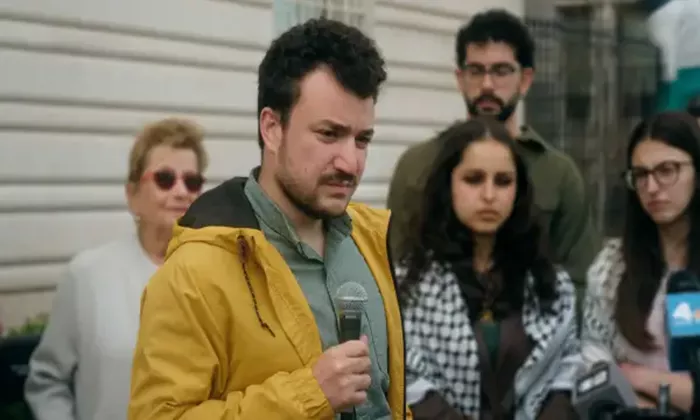The timely documentary The Encampments opens at a pivotal moment, just days after its debut at CPH:DOX, with a New York theater release followed by an expansion to Los Angeles. The film focuses on the student-led protests at Columbia University, documenting their efforts to demand divestment from companies involved in the Gaza conflict. Notably, two of the students featured in the film—Mahmoud Khalil, arrested by ICE for protesting the war, and Grant Miner, expelled from Columbia for the same reason—have recently made headlines, adding urgency to the film’s release.
However, the film’s relevance extends beyond its timely release. The Encampments emerges as a passionate protest film, echoing the resolve of the student activists who organized the spring demonstrations. Directors Michael T. Workman and Kei Pritsker open the documentary with media portrayals of the protestors as “radical,” “extreme,” and “disgusting,” setting the stage for a narrative that challenges these labels. The film shifts focus to three key student leaders, offering an intimate look into their motivations and actions.
Khalil, a Palestinian-American, served as the student negotiator, presenting the protesters’ demands to university officials. Miner, a Jewish student and leader of the student workers union, and Sueda Polat, a human rights graduate student, round out the trio featured. Through candid interviews filmed with front-facing cameras, each student discusses their personal reasons for joining the protests and their commitment to challenging the university’s financial ties to military corporations. Their clear and direct testimony is paired with archival footage that links their activism to past student movements, such as the protests against the Vietnam War.
The documentary tells the story in a straightforward, linear fashion, allowing the students’ journey from protest to occupation to unfold naturally. After their demands for divestment were ignored, the students took their cause to the campus lawns, setting up encampments as a form of protest. The filmmakers gained close access to the students, capturing not only the on-the-ground protests but also the community-building aspects of the movement: the music, food, and shared moments that sustained the protestors.
Pritsker’s cinematography places the audience amidst the encampment, providing a visceral experience of the energy and conviction driving the protest. The film’s editing strikes a balance between fast-paced sequences and slower, more contemplative moments, allowing the emotional weight of the protests to resonate without manipulating the viewer’s feelings. This approach is particularly effective as the movement spreads to other universities across the country, from New York to California and Georgia, expanding the scope of the film’s narrative.
In the 80-minute runtime, The Encampments captures a powerful and unfolding story. Its brevity is fitting, as the movement it documents is still evolving, with no clear resolution in sight. In one of the film’s final moments, Khalil is asked, “What would happen to you if you were deported?” He responds simply, “I will live.” This understated but resolute declaration encapsulates the spirit of the protestors, whose determination and commitment to change is at the heart of this compelling documentary.
Related topic:
‘Deaf’ Triumphs at 2025 Málaga Film Festival
‘Time Travel is Dangerous’ : A Delightfully Quirky British Mockumentary
Red Lorry Film Festival Announces Winners

